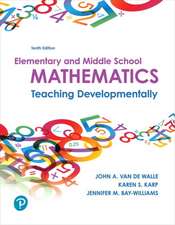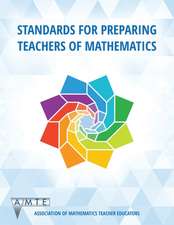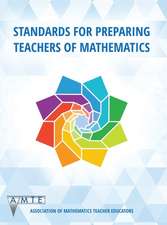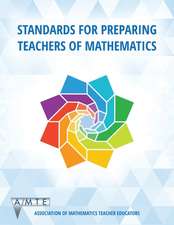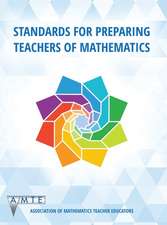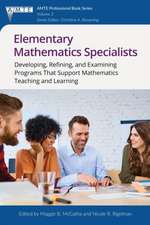Everything You Need for Mathematics Coaching: Tools, Plans, and a Process That Works for Any Instructional Leader, Grades K-12: Corwin Mathematics Series
Autor Maggie B. McGatha, Jennifer M. Bay-Williams, Beth McCord Kobett, Jonathan A. Wrayen Limba Engleză Paperback – 25 iun 2018
Din seria Corwin Mathematics Series
-
 Preț: 161.09 lei
Preț: 161.09 lei -
 Preț: 264.66 lei
Preț: 264.66 lei -
 Preț: 272.35 lei
Preț: 272.35 lei -
 Preț: 264.72 lei
Preț: 264.72 lei -
 Preț: 293.22 lei
Preț: 293.22 lei -
 Preț: 244.91 lei
Preț: 244.91 lei -
 Preț: 244.08 lei
Preț: 244.08 lei -
 Preț: 251.77 lei
Preț: 251.77 lei -
 Preț: 252.01 lei
Preț: 252.01 lei -
 Preț: 243.55 lei
Preț: 243.55 lei -
 Preț: 323.96 lei
Preț: 323.96 lei -
 Preț: 270.31 lei
Preț: 270.31 lei -
 Preț: 98.55 lei
Preț: 98.55 lei -
 Preț: 274.00 lei
Preț: 274.00 lei -
 Preț: 267.12 lei
Preț: 267.12 lei -
 Preț: 251.77 lei
Preț: 251.77 lei -
 Preț: 251.77 lei
Preț: 251.77 lei -
 Preț: 286.46 lei
Preț: 286.46 lei -
 Preț: 270.70 lei
Preț: 270.70 lei -
 Preț: 242.39 lei
Preț: 242.39 lei -
 Preț: 267.83 lei
Preț: 267.83 lei -
 Preț: 270.97 lei
Preț: 270.97 lei -
 Preț: 261.92 lei
Preț: 261.92 lei -
 Preț: 264.46 lei
Preț: 264.46 lei -
 Preț: 272.59 lei
Preț: 272.59 lei -
 Preț: 246.82 lei
Preț: 246.82 lei -
 Preț: 292.39 lei
Preț: 292.39 lei -
 Preț: 245.73 lei
Preț: 245.73 lei -
![Answers to Your Biggest Questions About Teaching Elementary Math: Five to Thrive [series]](https://i1.books-express.ro/bs/9781071857717/answers-to-your-biggest-questions-about-teaching-elementary-math.jpg) Preț: 237.28 lei
Preț: 237.28 lei -
 Preț: 258.92 lei
Preț: 258.92 lei -
 Preț: 274.00 lei
Preț: 274.00 lei -
 Preț: 269.89 lei
Preț: 269.89 lei -
![Answers to Your Biggest Questions About Teaching Secondary Math: Five to Thrive [series]](https://i4.books-express.ro/bs/9781071870792/answers-to-your-biggest-questions-about-teaching-secondary-math.jpg) Preț: 269.83 lei
Preț: 269.83 lei -
 Preț: 269.61 lei
Preț: 269.61 lei -
 Preț: 247.68 lei
Preț: 247.68 lei -
 Preț: 235.10 lei
Preț: 235.10 lei -
 Preț: 266.03 lei
Preț: 266.03 lei -
![Mathematize It! [Grades 6-8]: Going Beyond Key Words to Make Sense of Word Problems, Grades 6-8](https://i3.books-express.ro/bs/9781506354484/mathematize-it-grades-6-8.jpg) Preț: 246.82 lei
Preț: 246.82 lei -
 Preț: 272.08 lei
Preț: 272.08 lei -
 Preț: 270.31 lei
Preț: 270.31 lei -
 Preț: 265.76 lei
Preț: 265.76 lei -
![The Five Practices in Practice [Elementary]: Successfully Orchestrating Mathematics Discussions in Your Elementary Classroom](https://i3.books-express.ro/bs/9781544321134/the-five-practices-in-practice-elementary.jpg) Preț: 269.61 lei
Preț: 269.61 lei -
 Preț: 282.62 lei
Preț: 282.62 lei -
 Preț: 265.76 lei
Preț: 265.76 lei -
 Preț: 268.76 lei
Preț: 268.76 lei -
![Mathematize It! [Grades K-2]: Going Beyond Key Words to Make Sense of Word Problems, Grades K-2](https://i0.books-express.ro/bs/9781544389851/mathematize-it-grades-k-2.jpg) Preț: 246.00 lei
Preț: 246.00 lei -
![The Five Practices in Practice [Middle School]: Successfully Orchestrating Mathematics Discussions in Your Middle School Classroom](https://i3.books-express.ro/bs/9781544321189/the-five-practices-in-practice-middle-school.jpg) Preț: 268.77 lei
Preț: 268.77 lei -
 Preț: 264.66 lei
Preț: 264.66 lei -
 Preț: 279.75 lei
Preț: 279.75 lei
Preț: 302.72 lei
Nou
57.98€ • 59.73$ • 48.57£
Carte disponibilă
Livrare economică 01-15 februarie
Specificații
ISBN-10: 1544316984
Pagini: 360
Dimensiuni: 216 x 279 x 29 mm
Greutate: 0.86 kg
Ediția:1
Editura: SAGE Publications
Colecția Corwin
Seria Corwin Mathematics Series
Locul publicării:Thousand Oaks, United States
Recenzii
"Everything You Need for Mathematics Coaching: Tools, Plans, and a Process That Works for Any Instructional Leader, Grades K–12 is couched within a solid framework for supporting coaches to engage teachers in shifting their teaching practices. This framework, Leading for Mathematical Proficiency, supports specific tangible resources coaches can use to support teachers across different contexts in which shifting in practices is understood to be a continuum. Coaches will find resources embedded in each chapter supportive of reflecting upon practices and shifts in practices.”
“Whether you are an experienced mathematics coach or new to the role, this book will become your most valuable resource. By offering a doable coaching cycle as well as the specific tools you need for your daily work, the authors equip you to effectively collaborate and support teachers in shifting their instructional practices in research-informed ways to advance student learning of mathematics.”
“Coaches will find this resource invaluable in two ways. First, as a source for their own professional growth; and second, as their ‘go-to book’ for information and tools that they will come back to again and again as they help teachers achieve their professional goals.”
“This is a great resource and reference for all coaches and instructional leaders who are often challenged with little time to prepare for the critical work of supporting teachers with developing mathematically proficient students. This book provides a collection of resources to assist coaches in their everyday work. Each chapter includes a topical digest connected to a high-leverage teaching practice, ideas for aiding the development of the practice, and lessons from the field—all contributing to deepening a coach’s planning and preparation.”
“The daily work of the math coach lies in working with teachers. Yet the goal for all math coaches is student learning. This book is designed around the Leading for Mathematical Proficiency framework, which begins and ends with the students. This thoughtful, supportive, and easy to navigate book will be your go-to resource!”
“This book is a comprehensive, cohesive, and contemporary resource for mathematics instructional coaches and teacher educators. Professional learning providers are presented an arsenal of tools to help them to prepare teachers to meet the needs of each and every student in classrooms in which students’ mathematical reasoning and sense making skills are fostered and valued.”
“Mathematics coaches/specialists face a seemingly dizzying array of coaching-related responsibilities and challenges. This appropriately titled resource will be on the desk and in the book bag of coaches/specialists as they consider coaching lessons from the field, coaching questions, resources for additional learning, and adapt and use the many tools provided.”
“This book is a must-have for any professional who provides support to mathematics teachers. In particular, the Coach’s Toolkit—a set of frameworks, templates and protocols—provides an invaluable resource for supporting lesson planning, observation, data collection, reflection and much more!”
Cuprins
Acknowledgements
About the Authors
Part 1 Creating a Roadmap: Big Ideas of Coaching, Teaching, and Learning
Chapter 1. Coaching for Mathematical Proficiency
Leading for Mathematical Proficiency (LMP) Framework
Coaching Cycle
Getting Started
Chapter 2. Implementing Effective Teaching
Coach's Digest
Overview of Implementing Effective Teaching
Coaching Considerations for Professional Learning
Coaching Lessons from The Field
Coaching Questions for Discussion
Where to Learn More
Coach's Tookit
2.1 Shifts in Classroom Practice Self-Assessment
2.2 Essential Planning Questions for Effective Teaching
2.3 Practices, Shifts, and Zones (Oh My)
2.4 Mathematical Practices by Design
2.5 Lesson Plan Template
2.6 Mathematical Practice Look Fors
2.7 Shifts in Classroom Practice
2.8 Effective Teaching Look Fors
2.9 Noticing Mathematical Practices
2.10 Mapping Teaching Moves to Shifts in Classroom Practice
2.11 Effective Teaching of Mathematics
Part II Exploring Zones on the Journey: Professional Learning Focus Areas
Chapter 3. Content Kowledge and Worthwhile Tasks
Coach's Digest
Overview of Content Knowledge and Worthwhile Tasks
Coaching Considerations for Professional Learning
Coaching Lessons from the Field
Connecting to the Leading For Mathematical Proficiency (LMP) Framework
Coaching Questions for Discussion
Where to Learn More
Coach's Toolkit
3.1 Connecting Shifts to Content and Worthwhile Tasks Self-Assessment
3.2 Connecting Shifts to Content and Tasks
3.3 Focus on Fluency
3.4 P.I.C.S. Page
3.5 Analyzing Level of Cognitive Demand
3.6 Worthwhile Task Analysis
3.7 Developing Mathematical Proficiency
3.8 Implementing Cognitively Demanding Tasks
3.9 Impact on Students’ Emerging Fluency
3.10 Reflecting on Task Implementation
Chapter 4. Engaging Students
Coach's Digest
Overview of Engaging Students
Coaching Considerations for Professional Learning
Coaching Lessons from the Field
Connecting to the Leading for Mathematical Proficiency (LMP) Framework
Coaching Questions for Discussion
Where to Learn More
Coach's Toolkit
4.1 Connecting Shifts to Engaging Students Self-Assessment
4.2 Total Participation Technique (TPT) Planning
4.3 Planning or Cooperative Groups
4.4 Engagement Techniques
4.5 Cooperative Groups Data Gathering
4.6 Engagement Techniques Discussion Prompts
4.7 Reflecting on Cooperative Groups
4.8 Analyzing Learning in Cooperative Groups
Chapter 5. Questioning and Discourse
Coach's Digest
Overview of Questioning and Discourse
Coaching Considerations for Professional Learning
Coaching Lessons from the Field
Connecting to the Leading for Mathematical Proficiency (LMP) Framework
Coaching Questions for Discussion
Where to Learn More
Coach's Toolkit
5.1 Connecting Shifts to Questioning and Discourse Self-Assessment
5.2 High-Level Thinking Questions
5.3 Questioning Across Lesson Phases
5.4 Questioning Across Lesson Phases (focus on Productive Struggle)
5.5 Bloom’s Taxonomy (Revised) and Mathematical Knowledge
5.6 Questioning Patterns
5.7 Wait Time
5.8 Productive Discussion and Talk Moves
5.9 Question and Discourse Discussion Prompts
5.10 Reflecting on Bloom’s Taxonomy (Revised) and Mathematical Knowledge
Chapter 6. Formative Assessment
Coach's Digest
Overview of Formative Assessment
Coaching Considerations for Professional Learning
Coaching Lessons from the Field
Connecting to the Leading for Mathematical Proficiency (LMP) Framework
Coaching Questions for Discussion
Where to Learn More
Coach's Toolkit
6.1 Connecting Shifts to Formative Assessment Self-Assessment
6.2 Planning for Five “Key Strategies” for Formative Assessment
6.3 Developing Questions to Target Misconceptions
6.4 Using Rubrics for Formative Assessment
6.5 Observing and Providing Feedback
6.6 Observing Students’ Thinking
6.7 Observing Students’ Representations
6.8 Brief Formative Assessment Interview
6.9 Five “Key Strategies” for Formative Assessment Data Collection
6.10 Using Rubrics for Formative Assessment
6.11 Analyzing Formative Assessment Key Strategies
Chapter 7. Analyzing Student Work
Coach's Digest
Overview of Analyzing Student Work
Coaching Considerations for Professional Learning
Coaching Lessons from the Field
Connecting to the Leading for Mathematical Proficiency (LMP) Framework
Coaching Questions for Discussion
Where to Learn More
Coach's Toolkit
7.1 Connecting Shifts to Analyzing Student Work Self-Assessment
7.2 One Day/Many Artifacts Planning
7.3 Planning Task Implementation
7.4 Understanding Student Thinking
7.5 Analyzing One Student’s Work
7.6 Analysis of Students’ Misconceptions
7.7 Collaborative Analysis Protocol
Chapter 8. Differentiating Instruction for All Learners
Coach's Digest
Overview of Differentiating Instruction
Coaching Considerations for Professional Learning
Coaching Lessons from the Field
Connecting to the Leading for Mathematical Proficiency (LMP) Framework
Coaching Questions for Discussion
Where to Learn More
Coach's Toolkit
8.1. Connecting Shifts to Differentiated Instruction Self-Assessment
8.2 Student Diversity
8.3 Meeting Individual Needs
8.4 Different Ways to Differentiate a Lesson
8.5 Opening Closed Tasks
8.6 Focus on Five
8.7 Differentiating Instruction
8.8 Learning from Focus on Five
8.9 Impact of Open /Tiered/Parallel Tasks
Chapter 9. Supporting Emergent Multilingual Students
Coach's Digest
Overview of Supporting Emergent Multilingual Students
Coaching Considerations for Professional Learning
Coaching Lessons from the Field
Connecting to the Leading for Mathematical Proficiency (LMP) Framework
Coaching Questions for Discussion
Where to Learn More
Coach's Toolkit
9.1 Connecting Shifts to Supporting Emerging Multilingual Students Self-Assessment
9.2 Culturally Responsive Mathematics Instruction (CRMI)
9.3 Planning Strategies to Support Emergent Multilingual Students
9.4 Diagnostic Interview
9.5 Focus on Culturally Responsive Mathematics Instruction (CRMI)
9.6 Teaching to Support Emergent Multilingual Students
9.7 Reflecting on Support Emergent Multilingual Students
9.8 Reflecting on Using a Diagnostic Interview
Chapter 10. Supporting Students with Special Needs
Coach's Digest
Overview of Supporting Students with Special Needs
Coaching Considerations for Professional Learning
Coaching Lessons from the Field
Connecting to the Leading for Mathematical Proficiency (LMP) Framework
Coaching Questions for Discussion
Where to Learn More
Coach's Toolkit
10.1 Connecting Shifts to Supporting Students with Special Needs Self-Assessment
10.2 Challenges and Support Structures
10.3 Structuring a Lesson to Support Students with Special Needs
10.4 Effective Teaching for Students with Special Needs
10.5 Implementing Support Structures for Students with Special Needs
10.6 Reflecting on Effective Teaching for Students with Special Needs
10.7 Reflecting on Structuring a Lesson for Built-In Success
Part III Navigating a Successful Journey: Strategies and Tools for You, the Coach
Chapter 11. Interacting With Colleagues
Coach's Digest
Overview of Interacting with Colleagues
Building Trust
Establishing Rapport
Listening
Paraphrasing
Posing Questions
Where to Learn More
Chapter 12. Presenting Professional Development
Coach's Digest
Overview of Presenting Professional Development
Tips for Presenting Professional Development
Coaching Lessons from the Field
Where to Learn More
Coach's Toolkit
12.1 Professional Development Overview Planning
12.2 Professional Development Planning Checklist
12.3 Professional Development Planning Template
12.4 Differentiating Professional Development
12.5 Evaluating Professional Development
12.6 Sample Professional Development Activity: Grouping Strategy (P.I.C.S. Page)
12.7 Sample Professional Development Activity: Grouping Strategy (Shape Partners)
12.8 Sample Professional Development Activity: Mathematical Practices Mini-Vignettes
12.9 Sample Professional Development Activity: Mathematical Practices Playing Cards
12.10 Sample Professional Development Activity: Questioning and the Mathematical Practices
12.11 Sample Professional Development Activity: Effective Teaching Practices
Chapter 13. Facilitating Professional Learning Communities
Coach's Digest
Overview of Facilitating Professional Learning Communities
Tips for Facilitating Professional Learning Communities
Coaching Lessons from the Field
Where to Learn More
Coach's Toolkit
13.1 Meeting Standards Self-Assessment and Reflection
13.2 Facilitator Proficiency Scale
13.3 Sample Facilitation Activity: Appreciative Inquiry Protocol
13.4 Sample Facilitation Activity: Paraphrasing
13.5 Sample Facilitation Activity: Inclusion Strategies
13.6 Sample Facilitation Activity: Task Talk Protocol
Appendix: Bookmarks
Glossary
References
Notă biografică
Maggie B. McGatha works full time with coaches, teacher leaders, and administrators as a Training Associate for Cognitive Coaching? and Adaptive Schools. At the University of Louisville, she teaches courses on coaching and supporting collaborative groups along with advanced mathematics methods courses. Maggie is a former middle school mathematics teacher, the author of numerous articles, a co-author of Mathematics Coaching: Resources and Tools for Coaches and Leaders, K-12 (Pearson, 2014) and On the Money: Math Activities to Build Financial Literacy, Grades 6-8 (NCTM, 2015). She is active in state and national mathematics organizations including currently serving as the Vice President for the Membership Division (2017-2020) of the Association of Mathematics Teacher Educators (AMTE) and member of the Advisory Board for the Mathematics Institute of Wisconsin. She received her doctorate from Vanderbilt University (Tennessee). Maggie enjoys traveling and spending time with her family, especially her grandkids!

